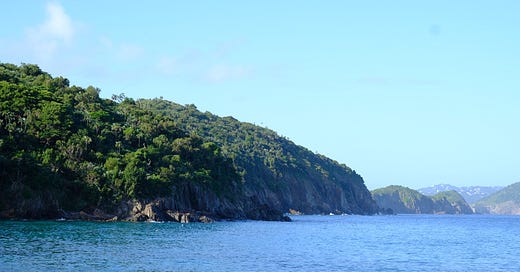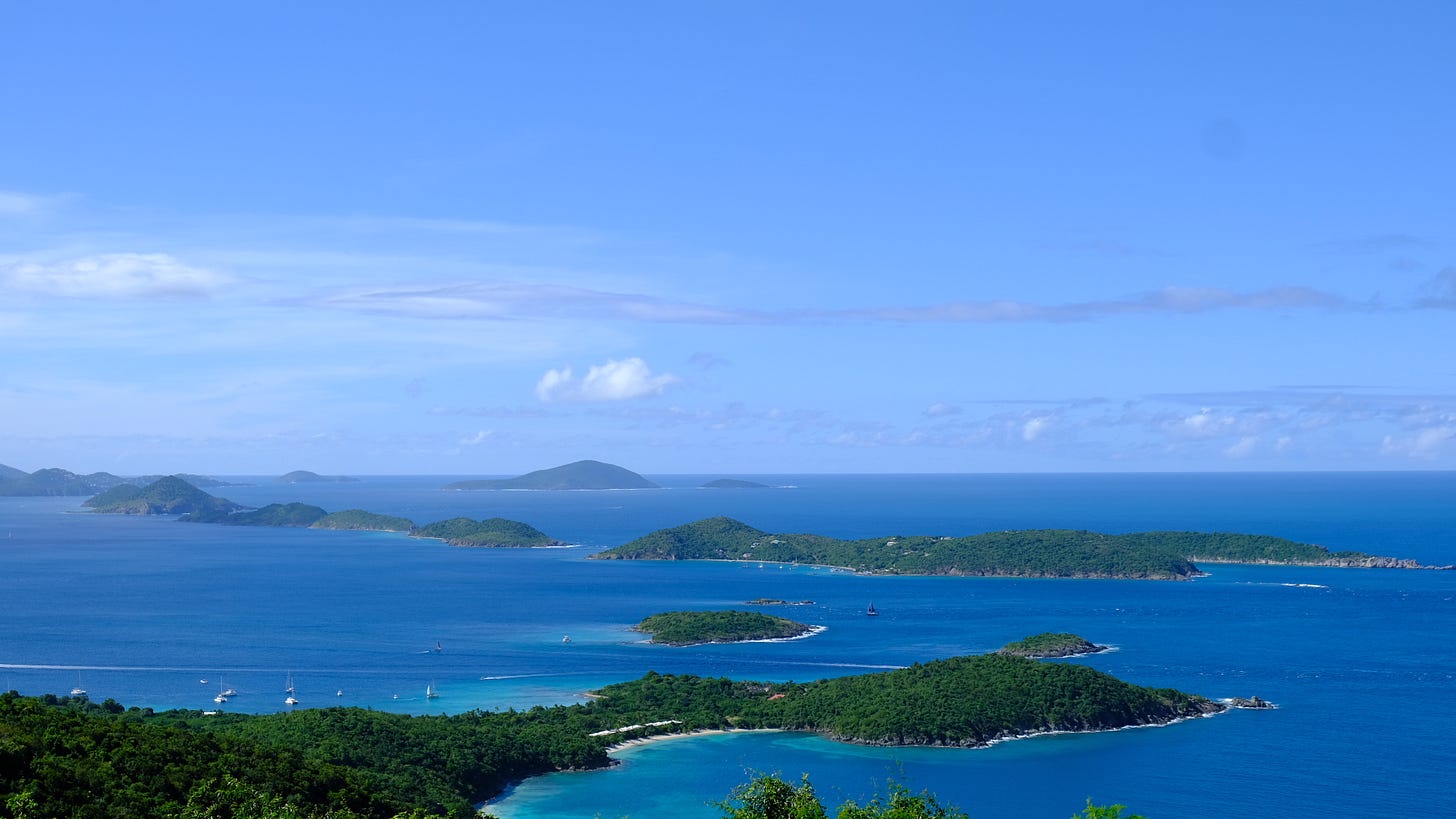Right now, I’m sitting on a balcony under a safari tent in the US Virgin Islands.[1] About six minutes from St. John and ten from St. Thomas — both by boat — there’s a small island, about 100 acres, called Lovango Cay. The slopes are steep, and building is difficult. The population peaked at 49 back in 1917. But now a small resort has opened up, mostly safari tents on wooden platforms, on the premise that, if it’s hard to build there, then certainly it will be quiet. And there’s nothing much going on besides a hell of a view.
Here’s what I’m learning: I’m bad at vacation. I like goals, objectives, work to achieve an end. Here, I’m on a beach. I don’t have my clubs. I hit send on last Thursday’s newsletter and had nothing left to do. With the structure removed, something deeper down was left exposed.
I wear a Whoop, mostly to track sleep. But I got an alert on Friday that I’d been in the “high stress zone” for ten hours. I hadn’t done anything besides sit on the beach and read. But it was right, and I could feel something tense and adrenal leaving my pores. It’s a kind of rehabilitation, almost: you take away, and you withdraw. And the body adapts. It’s not the most comfortable form of vacation, but it’s necessary.
St. John is the nearest mainland, population 5,000. It’s mostly national park land, great for hiking. Yesterday, my family took the ferry over, grabbed a map from the parks department, and set out for the Caneel Hill trailhead.
Within fifty feet, we crossed paths with another family. “We thought it’d be easier,” the dad said. “We were going to the Windmill Bar, but it’s like an hour up there. Straight uphill. Fuck that.” My family was looking for a hike, and the Windmill Bar sounded like a fun destination. We asked if we were on the right route. We were. We set off.
A couple hundred feet up, a dog came down the hill and greeted us. About forty pounds of a breed I couldn’t place.[2] Happy to see us, as dogs are. A man, fifty feet behind, told us his name was Sounder. We said we were going to the Windmill Bar, and he told us that it was back on another route. We thanked him and reverted to the original plan, up Caneel Hill. We and Sounder went our separate ways.
I’m not a Buddhist, for two reasons. First, I still feel in too much flux for general declarations. Second, I think it’d be disrespectful for a white guy from New England who eats meat and swats midges to lump himself with the devout members of the faith. With that said, it usually answers the big questions better than the western analytic schools do. Universal definitions are usually bad, and I haven’t met a counterfactual that didn’t feel desperate and hand-wavy, and, for the big stuff, it seems analysis is the wrong tool.
Sometimes, there’s a question that doesn’t make much sense in a Buddhist[3] context at all. One of these: I want to be good at the things I do. Buddhism’s whole slant, broadly, is that wanting causes suffering, and we should let go of desire. Wise, in most circumstances. But it seems, in this context, I should give up my desire to be good at golf and to write well. It seems a life should have purpose, but purpose comes with desire for doing. The logical conclusion seems that you just sit around, not doing much, without much desire, but without much ambition either.
Buddhism[4] differs from other traditions in that there isn’t nearly as much “church.” If you have Abrahamic questions, you ask a Priest/Rabbi/Imam. If you can find a master to ask a Buddhist question, he’ll often (in my experience) tell you that the very problem is your desire for answers. This, at first, is frustrating. But I’ve realized: usually, a master isn’t confused the way I am. To them, it’s my question that doesn’t make sense. I’ve just made up this very strange logical structure to confuse myself. I should let it go.
Another mile or so along the trail, and up another hundred-plus feet of elevation, we came to a crossroads. We got out the map, tried to orient ourselves, started making decisions. We heard a jingling coming over the hill, and Sounder was back, a wet nose brushing against our hands and legs as he reacquainted himself, glad to see us.
The man, whose name we never got, was close behind. He was glad we crossed paths again — he’d been mistaken, and we actually were heading towards the Windmill Bar. Another couple miles and we’d be there. We thought, if we were already this far along, we might as well push through the rest of the way. We thanked the man, and Sounder gave us a look of acknowledgement before heading down another trail, the man following behind.
Those couple miles were more than we bargained for. The trail was wet, and we slipped around, my dad nearly losing an already-reconstructed ACL. The last half mile ran along a two-lane mountain road with no shoulder and USVI motorists — who generally treat traffic rules as suggestions and driving as a feat of athleticism. By the time we arrived, we were 660’ above sea level, much higher than we’d ever have chosen to climb at once. But it was manageable up to Caneel Hill, and a short distance to the fork, and suddenly we were close enough to go for it. And, by the end, we looked out at this:
There’s an old Zen koan[5] about a master pouring tea. The student comes to the master and asks a bunch of questions — he’s well studied, and he has a lot of ideas. The master listens, and he begins filling the student’s teacup, and he keeps pouring, and the teacup fills and then overflows and spills. The student says, “Stop, the cup is already full!” And the master replies, “You come asking for teaching, but you are already full of ideas. You must first empty yourself before I can teach you anything.”
I, [gesturing generally at myself], have an overflowing cup. I know this. And, as I try to empty myself,[6] a problem emerges. In dropping the dead weight, surely I can’t let go of everything — I should hold onto the good things: the confidence, the winning memories, the learned experience. So the problem of emptying becomes a problem of filtration: what to keep, and what to discard. What’s serving me and what’s not? What’s good and what’s bad? Surely there’s a distinction to be made, some basis for separating the two…
But, once in a while, I’ll find myself with an empty cup. I’ll just kind of be there, and the problems just sort of won’t. The questions make less sense than the answers. “Filtration” is an excuse not to trust, to hold onto familiar fears. But you’ll realize — when a song hits your ear just right, or you catch a long iron on the screws, or you take a deep breath and feel it click into place — that you can trust the bottom of an empty cup. It has everything you need and nothing you don’t. And you breathe and feel yourself breathe, breathe and grow familiar, breathe and let the rest escape through your pores. The cup will fill again, but that’s why we get comfortable here, why we practice and learn to trust it and to return — to what’s empty, what’s underneath, what’s sensible, all around, and always with us.
[1] Actually, as you read this, I’m home in Connecticut, or maybe even back in Georgia. But writing is strange, temporally. So, for our purposes, I’m still on that balcony.
[2] “He’s a mutt,” we learned later. “He’s everything.”
[3] I use “Buddhist” as a hand-wavy stand-in — generally, the non-analytic traditions. I regret not coming up with a better term.
[4] Again, a shoddy stand-in term.
[5] Shoutout to my guy Winston for this one — cheers brother. Pax.
[6] Whatever this entails — meditation seems to run this direction, along with the moments when I can find it within myself to fucking relax.






Have you ever read Zen and the Art of Motorcycle Maintenance? Nothing to do with golf but for some reason I kept thinking about the way I approach playing and practicing the game. Similar discussions on emptying desire and that craftsmanship comes not from results but from harmony with the work. Think you'd like it. Enjoy "vacation"